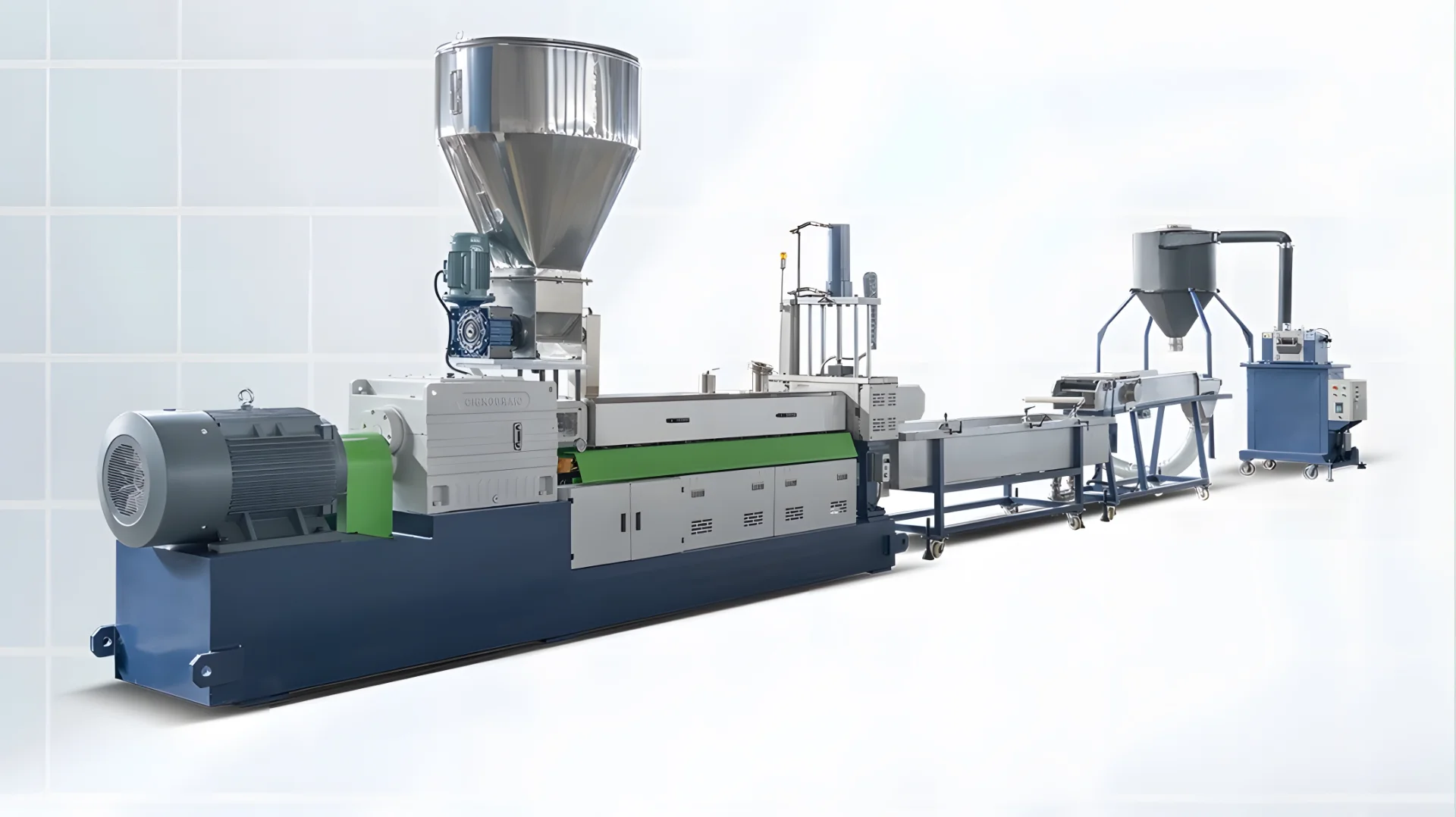El granulador de plastico is a key piece of equipment in the plastics processing industry. Choosing a plastic granulator that meets your company’s needs is a crucial step in ensuring production efficiency and product quality. However, there are various types and brands of plastic granulators on the market, so making the right choice is a challenge for many companies. The purpose of this guide is to help companies choose the most suitable model of plastic granulator based on their own needs.
Contenido
1. Determine Your Production Requirements
1.1 What type and form of plastic do you produce?
Different types of plastic have different physical and chemical properties, so they need to be processed with different types of granulators. Here are some common types and forms of plastic and their corresponding granulator choices:
- Examples of plastic types:
- Polyethylene (PE): Commonly used for making plastic bags, bottles, etc. For the production of PE pellets, single screw granulators are usually used.
- Polipropileno (PP): Widely used, including plastic containers, furniture, etc. Single screw granulators are also suitable for producing PP pellets.
- Polyvinyl chloride (PVC): Commonly used for making pipes, window frames, etc. For PVC processing, twin screw granulators are usually needed to handle its unique processing requirements.
- Examples of plastic forms:
- Pellet form: Used for producing raw material pellets for plastic products, such as injection molding, extrusion, etc. In this case, a granulator suitable for pellet processing is usually chosen.
- Sheet form: Used for producing plastic sheets, films, etc. If your production needs to reprocess the sheet into pellets, a specific type of granulator may be needed to meet this requirement.
- Pipe form: Used for producing plastic pipes. For the pipe form of plastic, a specific granulator suitable for pipe processing may be needed.
By understanding the specific types and forms of plastic you produce, you can more accurately choose the appropriate granulator, thereby improving production efficiency and product quality.
1.2 What is your production scale?
The size of the production scale directly affects the choice of the appropriate plastic granulator specifications and capacity. Here are some examples of production scale and the corresponding granulator choices:
- Small-scale production: For example, small processing plants or individual studios with relatively low production volumes. In this case, smaller specification single screw granulators can be selected to meet basic production needs.
- Medium-scale production: For example, medium-sized factories or cooperatives with moderate production volumes. You might consider choosing medium-sized single or twin-screw granulators to meet higher capacity needs.
- Large-scale production: For example, large manufacturing companies with large production volumes. In this case, high-capacity twin-screw granulators are usually needed to meet the requirements of large-scale production.
By understanding your production scale, you can better determine the required granulator specifications and capacity, thereby improving production efficiency and reducing production costs.
1.3 Do you need special processing functions?
Some production processes require special processing functions, such as color separation, material mixing, etc. Here are some examples:
- Color separation: If you need to process different colors of plastic separately, you may need to choose a special granulator with color separation functions.
- Material mixing: If you need to mix different types of plastic during the production process, you may need to choose a special granulator with mixing functions.
2. Understand Different Types of Plastic Granulators
2.1 Single Screw Granulator
The single screw granulator is a common and widely used plastic processing equipment, suitable for handling various common plastic raw materials. Here are some characteristics and applicable scenarios of the single screw granulator:
- Applicable types of plastic: Single screw granulators are generally suitable for processing some common plastic raw materials, such as polyethylene (PE), polypropylene (PP), polyvinyl chloride (PVC), etc. These plastics have better fluidity and processing performance, and are easy to process into pellets in a single screw granulator.
- Relatively low price: Because the structure of the single screw granulator is relatively simple and the production cost is relatively low, the price is usually more affordable. This makes the single screw granulator the first choice for small and medium-sized manufacturers.
- Applicable scenarios: Single screw granulators are suitable for various small and medium-sized plastic processing factories, such as plastic product manufacturers, plastic recycling processing factories, etc. They usually have flexible production capabilities and can meet the needs of different scale production.
2.2 Twin Screw Granulator
The twin screw granulator is a highly efficient plastic processing equipment, suitable for handling more complex plastic raw materials and processing techniques. Here are some characteristics and applicable scenarios of the twin screw granulator:
- Applicable types of plastic: Twin screw granulators are generally suitable for processing more complex plastic raw materials, such as engineering plastics, modified plastics, etc. These plastics have higher viscosity and difficult processing characteristics, and can be better mixed and processed in the twin screw granulator.
- High production efficiency: Because the twin screw granulator uses a twin screw structure, it has higher mixing performance and better processing capabilities, so it usually has higher production efficiency. This makes them the first choice for large manufacturers.
- Applicable scenarios: Twin screw granulators are suitable for various large-scale plastic processing factories, such as automobile parts manufacturers, plastic composite material factories, etc. They usually have larger production capabilities and higher processing accuracy, and can meet high-demand production requirements.
3. Consider the Quality and Performance of the Equipment
3.1 Good Wear Resistance and Stability
The plastic granulator is a long-running device, so good wear resistance and stability are crucial. You should choose a granulator made of high-quality wear-resistant materials to ensure that it will not wear out too much during long-term operation. Stability is also important. Stable equipment can maintain efficient production operations and reduce downtime and maintenance time.
3.2 High Processing Capacity
The processing capacity of the equipment directly affects the production efficiency and capacity. You should choose a granulator with high processing capabilities to meet your production needs. Efficient granulators can quickly and stably process raw materials into pellets, improve production efficiency, and reduce production costs.
3.3 Advanced Control System
An advanced control system can help you control the operation and adjustment of the equipment more accurately. You should choose a granulator with an advanced control system to achieve precise temperature control, level control, and other functions, thereby improving the consistency and quality stability of the product. An advanced control system can also improve the automation of the equipment, reduce manual intervention, and reduce production costs.
3.4 Safety and Environmental Performance
Safety and environmental performance are another important factor to consider when choosing a plastic granulator. You should choose equipment that meets safety standards to ensure the safety of operators. At the same time, environmental performance is also important. Environmentally friendly granulators can reduce the emission of exhaust gases and wastewater and reduce the impact on the environment.
3.5 After-sales Service and Maintenance Support
Finally, you also need to consider the after-sales service and maintenance support provided by the equipment supplier. Choosing a supplier who can provide timely and professional after-sales service is very important. They should be able to provide you with equipment installation, debugging, training, and regular maintenance services to ensure that the equipment can run stably for a long time.
4. Look for a Reliable Supplier
4.1 Rich Production Experience and Technical Strength
Choosing a supplier with rich production experience and technical strength is crucial. The supplier should have many years of experience in producing plastic granulators, be familiar with the needs and trends of the plastic processing industry, and have advanced technology and production equipment. Such suppliers can provide you with high-quality products and professional technical support, helping you solve various problems in the production process.
4.2 Good Reputation and Word of Mouth
Choosing a supplier with a good reputation and word of mouth is very important. You can understand the reputation and word of mouth of the supplier by checking customer reviews, industry recognition, and related certificates. Good reputation and word of mouth are usually a direct reflection of the supplier’s product quality and service. Choosing such a supplier can reduce procurement risks and protect your rights.
4.3 Comprehensive After-sales Service
The supplier should be able to provide comprehensive after-sales services, including equipment installation, debugging, training, and maintenance. Before choosing a supplier, you should understand its after-sales service system and service commitments to ensure that you can get support and help in time. Good after-sales service can ensure the long-term stable operation of the equipment and save you maintenance costs and time.
4.4 Cost and Delivery Time
Finally, you also need to consider the supplier’s cost and delivery time. When choosing a supplier, in addition to focusing on product quality and service, you should also consider the price and delivery time. You can compare with multiple suppliers, choose the supplier with the highest cost performance, and establish a long-term cooperative relationship with them to get better prices and services.
Conclusión
Elegir lo correcto granulador de plastico for your company is a key step to ensure production efficiency and product quality. By clarifying production requirements, understanding different types of plastic granulators, considering the quality and performance of equipment, and looking for reliable suppliers, you can better choose the most suitable plastic granulator model for your company, improve production efficiency, reduce production costs, and achieve better economic benefits.
If you need further consultation or help, please feel free to contact us, we will be happy to serve you.




